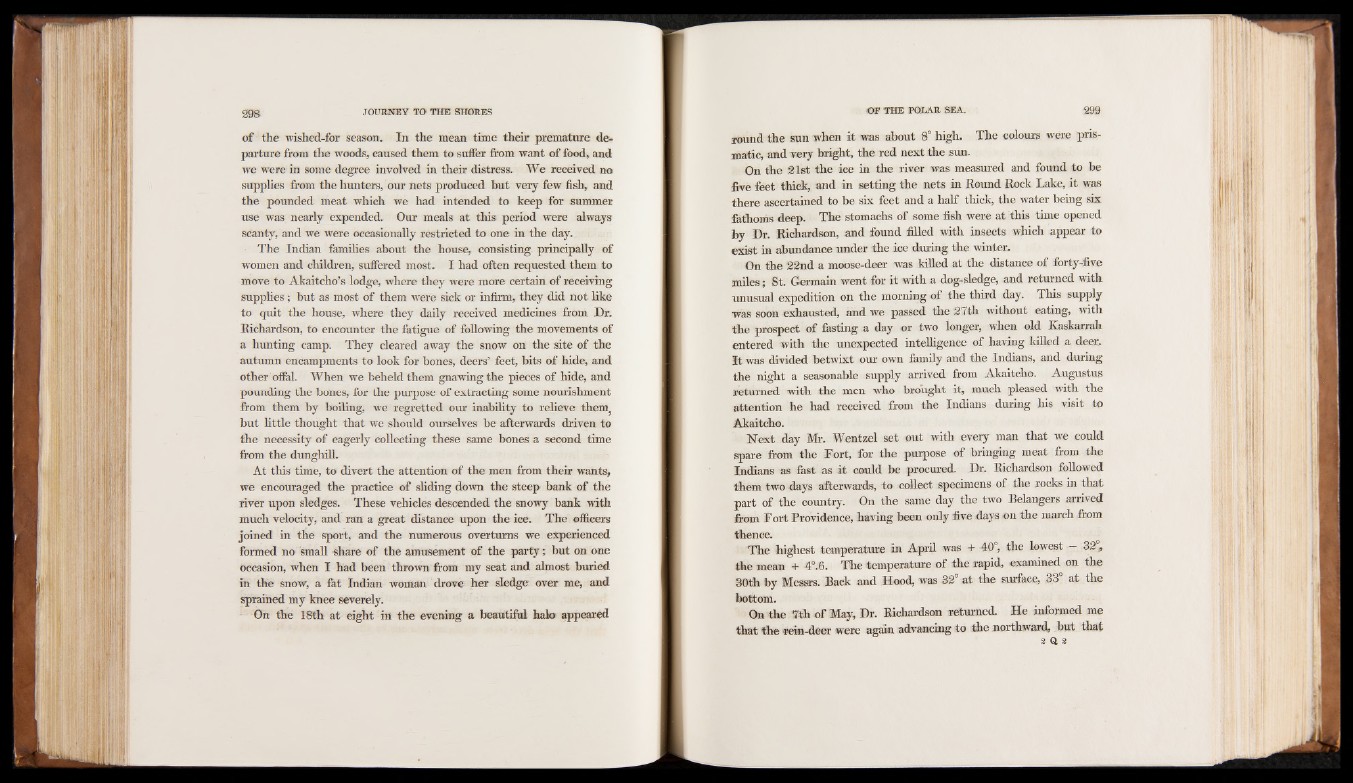
of the wished-for season. In the mean time their premature departure
from the woods, caused them to suffer from want of food, and
we were in some degree involved in their distress. We received no
supplies from the hunters, our nets produced but very few fish, and
the pounded meat which we had intended to keep for summer
use was nearly expended. Our meals at this period were always
scanty, and we were occasionally restricted to one in the day.
The Indian families about the house, consisting principally of
women and children, suffered most. I had often requested them to
move to Akaitcho’s lodge, where they were more certain of receiving
supplies ; but as most of them were sick or infirm, they did not like
to quit the house, where they daily received medicines from Dr.
Richardson, to encounter the fatigue of following the movements of
a hunting camp. They cleared away the snow on the site of the
autumn encampments to look for bones, deers’ feet, bits of hide, and
other offal. When we beheld them gnawing the pieces of hide, and
pounding the bones, for the purpose of extracting some nourishment
from them by boiling, we regretted our inability to relieve them,
but little thought that we should ourselves be afterwards driven to
the necessity of eagerly collecting these same bones a second time
from the dunghill.
At this time, to divert the attention of the men from their wants,
we encouraged the practice of sliding down the steep bank of the
river upon sledges. These vehicles descended the snowy bank with
much velocity, and ran a great distance upon the ice. The officers
joined in the sport, and the numerous overturns we experienced
formed no small share of the amusement of the party; but on one
occasion, when I had been thrown from my seat and almost buried
in the snow, a fat Indian woman drove her sledge over me, and
sprained my knee severely.
On the 18th at eight in the evening a beautiM halo appeared
round the sun when it was about 8° high. The colours were prismatic,
and very bright, the red next the sum.
On the 21st the ice in the river was measured and found to be
five feet thick, and in setting the nets in Round Rock Lake, it was
there ascertained to be six feet and a half thick, the water being six
fathoms deep. The stomachs of some fish were at this time opened
by Dr. Richardson, and found filled with insects which appear to
exist in abundance under the ice during the winter.
On the 22nd a moose-deer was killed at the distance of forty-five
miles; St. Germain went for it with a dog-sledge, and returned with
unusual expedition on the morning of the thud day. This supply
was soon exhausted, and we passed the 27th without eating, with
the prospect of fasting a day or two longer, when old Kaskarrah
entered with the unexpected intelligence of having killed a deer.
It was divided betwixt our own family and the Indians, and during
the night a seasonable supply arrived from Akaiteho. Augustus
returned with the men who brought it, much pleased with the
attention he had received from the Indians during his visit to
Akaiteho.
Next day Mr. Wentzel set out with every man that we could
spare from the Fort, for the purpose of bringing meat from the
Indians as fast as it could be procured. Dr. Richardson followed
them two days afterwards, to collect specimens of the rocks in that
part of the country. On the same day the two Belangers arrived
from Fort Providence, having been only five days on the march from
tfhenoe.
The highest temperature in April was + 40°, the lowest — 32,
the mean + 4°. 6. The temperature of the rapid, examined on the
30th by Messrs. Rack and Hood, was 32° at the surface, 33° at the
bottom.
On the 7th of May, Dr. Richardson returned. He informed me
that the rein-deer were again advancing to the northward, but that
2 Q 2